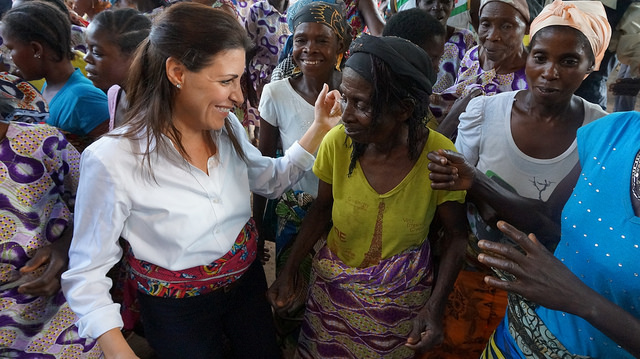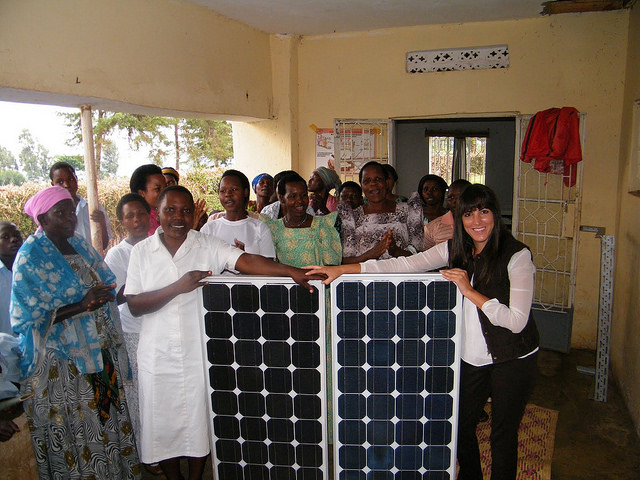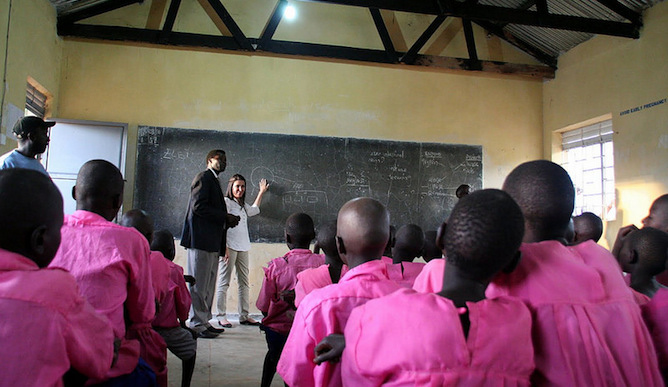Picture a remote African village where women and children spend hours every day finding, collecting and carrying water and wood back to their homes. Envisage these villagers standing in long lines for the privilege of digging into muddy holes with their hands to scoop dirty water into Jerry cans, and later, searching for twigs and branches with which to build fires.
It was just such a sight that Sivan Ya’ari could not get out of her mind after visiting Africa as part of her job at an international clothing company.
A few years later, her master’s degree in international energy management and policy from Columbia University’s School of International and Public Affairs led her to an internship at the United Nations Development Program.
From here, it was not a far leap to establish Innovation: Africa (originally called “Jewish Heart for Africa”), a non-profit organization whose mission is to bring sustainable Israeli technologies to rural African villages.
In summer 2012, the organization was granted special consultative status to the United Nations Economic and Social Council. On November 1, 2013, it won the Innovation Award at the UN Global South-South Development Expo in Nairobi.
Since its establishment in New York in 2008 with funding from foundations, philanthropies and individuals, Innovation: Africa has transformed 71 famine-ridden villages in Ethiopia, Tanzania, Malawi, Uganda and South Africa into budding communities with hope for the future.

Solar power and water to schools, clinics
At her Tel Aviv offices, donated recently by the Nakash brothers, owners of Jordache, Ya’ari tells ISRAEL21c that her goal was this: “Figure out how to draw water from the aquifer under the desert with which to grow food.”
Ya’ari, 35, not only found her calling through this endeavor, but also met her future husband, David Borowich (now David Ya’ari), an American-Jewish financier and social activist who founded organizations including Dor Chadash, which hosts exchange programs between Israeli and American Jews.
In 2009, the couple left New York to settle in Israel and now have three children. One private contribution they have taken on themselves is providing shoes and mattresses for African orphans.
The system of bringing solar energy to schools, medical clinics and orphanages in the most remote villages is one that Ya’ari calls “simple but highly effective.” And it also benefits Israel, another of the NGO’s goals.
Ya’ari first locates a problem area by consulting with government ministers. She then meets with village elders, who provide her team with a list of all the clinics, schools and orphanages that have no electricity or water.
With solar panels purchased in Israel and drilling machines rented from capital cities, the Innovation: Africa team – and local contractors – pump clean water from the aquifers and pump it to water stations close to surrounding villagers. All this is accomplished for just $1 to $3 per person.
The money for these projects is raised through donations. “One hundred percent of it goes to Africa – and to the Israeli companies whose technology and equipment are purchased,” says Ya’ari. “Not a penny of it is spent on the running of the NGO. All our salaries and overhead are paid through foundations.”
It is this kind of fiscal efficiency and responsibility that Innovation: Africa is trying to instill in the estimated 540,000 villagers it has directly helped so far, and in those on the agenda for assistance. This year, the team plans to install the system in 38 additional villages, if funding is found.

Once a village has clean water and electric light at its disposal, immediate change takes place. The children can bathe and go to school. The schools, suddenly overcrowded from the influx of students, have lighting, which enables them to stay open for evening classes. The adults begin using the water to grow crops, and within months are able to sell them.
The same applies to the clinics. With electricity, they can be equipped with refrigerators in which to store medication. Then, doctors from the cities are more willing to relocate to villages they had previously shunned for lack of proper work conditions.
Cell-phone charging stations
Yet, in spite of the positive snowball effect, the system is far from glitch-free. One main problem that Ya’ari faced was replenishing supplies, including light bulbs, without which the entire endeavor would die within four years – the life span of the batteries for the solar panels. She had to figure out a way for the villagers to earn the money to keep the system going.
She began noticing that many villagers had cell phones but nowhere to charge them. So she created cell-phone charging stations within each school, clinic and orphanage, and taught women villagers how to charge the phones. The 5- to 15-cent fee (depending on the country and the village) goes into a bank account earmarked for purchasing light bulbs and batteries.
“The good news is that most of them earn more money than they need for this purpose,” says Ya’ari. “This gives them incentive to invest the extra funds in the clinics and schools to buy additional equipment. And it has been a boost to the women, who are now running these small businesses.”
With the income from these businesses, the villagers will even be able to replace solar panels after their lifespan of about 25 years.
Though each village has a local manager employed by Innovation: Africa, monitoring of this process is done through an Israeli computer program hooked up to a box in each location. This box registers electricity use and malfunctions. Ya’ari can follow this from her computer in Israel. And when something goes wrong, she receives an automatic alert.
“Only in Israel!” she says proudly, pointing to another Israeli patent that has been invaluable to the project: a special lock for the solar panels, to prevent theft.
If a village does not uphold its end of the contract with Innovation: Africa, the system is moved to a different village.
One time, Ya’ari noticed that a particular school was not turning on the lights in the evenings, which meant no night classes were being conducted. She discovered that the village “witches” threatened to hex anyone who used the electric lighting, as they claimed that it was sapping their powers.
“I learned my lesson from that experience,” she says. “Now I always make sure to ask whether a village has a ‘witch problem’ before beginning a project there.”
For more information, see www.innoafrica.org.












